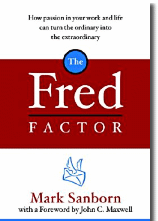|
|
|
|
(continued from previous page)
Martin Luther King Jr. said, "If a man is called to be a street sweeper, he should sweep streets even as Michelangelo painted or Beethoven composed music or Shakespeare wrote poetry. He should sweep streets so well that all the hosts of heaven and earth will pause to say, `Here lived a great street sweeper who did his job well."'
Fred the Postman understood this. He is proof that there are no insignificant or ordinary jobs when they're performed by significant and extraordinary people.
Politicians are fond of telling us that work gives people dignity. I agree. Having work to do and the means to make a living for oneself and one's family is important. But that is only half the equation. What we haven't been told nearly enough is that "people" give work dignity. "There are no unimportant jobs, just people who feel unimportant doing their jobs." That's probably why B. C. Forbes, the legendary founder of "Forbes" magazine, said, "There is more credit and satisfaction in being a first-rate truck driver than a tenth- rate executive."
I have met cab drivers who are more inspired about how they perform their work than some upper-level managers who seem to have lost any drive for excellence. While position never determines performance, ultimately performance determines position in life. That's because position is based on results rather than intentions. It's about actually doing what others usually only talk about.
Setting a higher standard is more challenging than simply achieving the status quo. Withstanding the criticism of those who are threatened by your achievement depends not on your title, but on your attitude. Ultimately, the more valuable you are to others--the more value you create in your work or your interactions with others--the more value will eventually flow toward you. Faithfully doing your best, independent of the support, acknowledgment, or reward of others, is a key determinant in a fulfilling career.
PRINCIPLE 2: SUCCESS IS BUILT ON RELATIONSHIPS
Throughout my life, most of the mail sent to me has ended up in my mailbox. This service was performed by the U.S. Postal Service, which gave me what my postage paid for--nothing more, nothing less.
In contrast, the service I received from Fred the Postman was superior for many reasons, the biggest reason being my relationship with him. It differed from the relationship I've had with any other postal carrier, before or since. In fact, Fred is the only postal carrier I've ever had a personal relationship with.
It's easy to see why Fred stood above the crowd. Indifferent people deliver impersonal service. Service becomes personalized when a relationship exists between the provider and the customer. Fred took time to get to know me and to understand my needs and preferences. He then used that information to provide better service than I had ever received before. Do you have this capability?
Fred is proof that in any job or business, relationship building is the most important objective because the quality of the relationship determines the quality of the product or service. That's also why
* leaders succeed when they recognize that their employees are human;
* technology succeeds when it recognizes that its users are human; and
* employees like Fred the Postman succeed when they recognize their work involves interacting with human beings.
PRINCIPLE 3: YOU MUST CONTINUALLY CREATE VALUE FOR OTHERS, AND IT DOESN'T HAVE TO COST A PENNY
Do you ever complain that you don't have enough money? the necessary training? the right opportunities? In other words, do you believe that you lack resources to perform at a higher level?
Then consider Fred. What resources did he have at his disposal? A drab blue uniform and a bag full of mail. That's it! Yet he walked up and down streets with his heart and head stirred by possibilities. His imagination enabled him to create value for his customers, and he didn't need an extra dollar to do it. He just thought harder and more creatively than other postal carriers.
In doing this Fred mastered the most important job skill of the twenty-first century: the ability to create value for customers without spending more money to do it.
You, too, can replace money with imagination. The object is to outthink your competition rather than outspend them.
I've met many people who were concerned that they might become victims of downsizing and lose their jobs. I always tell them to quit worrying. My indifference shocks them. Actually my intent is to refocus their attention from being employed to being "employable."
(continued on next page)
|
|
|
|
The Fred Factor
by Mark Sanborn
Buy online:
$10.02
Copyright © 2004
by Mark Sanborn
Published by
Currency a division
of Random House
|
|
|
